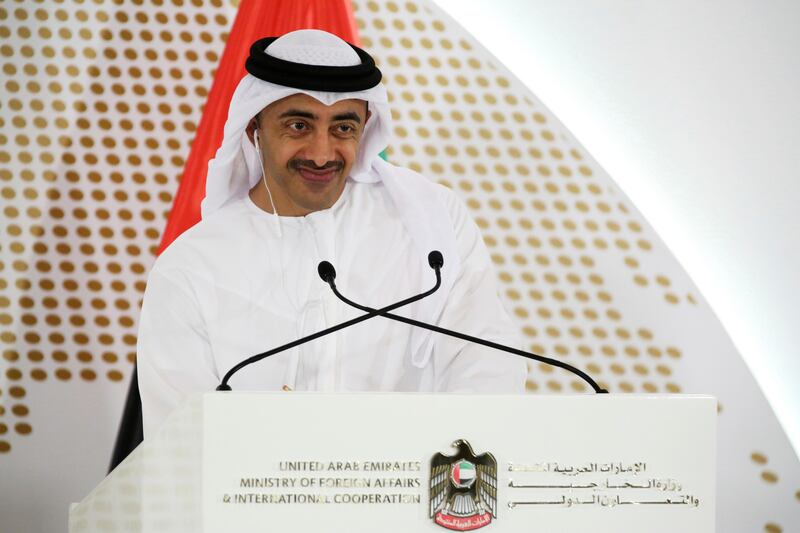The UAE Foreign Minister said he hoped Qatar understood that “enough is enough” over its support for terrorism as Doha again rejected demands from Arab countries to change its behaviour.
Foreign ministers from the UAE, Saudi Arabia, Bahrain and Egypt meet in Cairo on Wednesday to consider Qatar's written response to their demands.
“We hope the steps we have taken with the help of our partners, including Germany, to convey the voice of reason and wisdom to the leadership in Qatar ... that enough is enough” has been understood, Sheikh Abdullah bin Zayed said alongside his German counterpart, Sigmar Gabriel.
“Enough with the support of terrorism and enough with the support of those that are against peace.”
Sheikh Abdullah said the four countries boycotting Qatar are still waiting for Kuwait to deliver the response from Qatar and "once we examine it among ourselves we will take the decision of course".
Qatar announced on Monday that it will increase its natural gas production by 30 per cent between 2022 and 2024 in a sign that it is looking to increase its importance to the global economy as the premier gas exporter, and could be preparing for the dispute to continue.
The four countries agreed to a Kuwaiti request for a 48-hour extension to the deadline they had set on their demands, which expires on Wednesday. Qatar delivered its response to Kuwait on Monday, but the details have not been made public.
Mr Gabriel travelled to Doha later on Tuesday for talks with the Qatari foreign minister, Sheikh Mohammed bin Abdulrahman Al Thani, who said the list of demands “is unrealistic and is not actionable”.
"We cannot implement them as they infringe on the sovereignty of Qatar," he said.
Mr Gabriel, speaking next to Sheikh Mohammed, said constructive debate is needed on which of the demands made by the four countries are justified and which are not. He added that Doha had acted with “restraint” to the economic measures against it.
UAE officials have said the countries could take additional steps if Qatar refuses to meet the demands including making the economic sanctions permanent and even seeking Doha’s expulsion from the GCC.
Sheikh Abdullah addressed questions over what exact steps could be taken if the dispute is not resolved, saying “it is premature to talk about the extra sanctions and steps and procedures to be taken”. He added that “any possible further steps taken against Qatar will be within international law”.
Saudi Arabia, the UAE, Bahrain and Egypt - which all have severed diplomatic, travel and commerce links with Qatar and expelled its citizens - accuse Doha of supporting extremist groups and meddling in their domestic affairs.
They delivered a list of 13 demands via Kuwait’s emir, who is leading mediation efforts, that include ending funding for terrorist groups, shuttering Qatar-linked media that promote extremism and provide a platform for opposition figures, and close the permanent Turkish base in Qatar.
Qatar has denied accusations that it funds such groups and does not consider the Muslim Brotherhood to be a terrorist organisation.
Earlier on Tuesday, Minister of State for Foreign Affairs Dr Anwar Gargash said the GCC stands "before a historical turning point" as the extended deadline for Qatar to respond approaches.
This turning point "has no relation with sovereignty", he tweeted. "At its heart is [Qatar’s] approach to the group and its commitment."
As the four countries meet in Cairo, Sheikh Mohammed holds a press conference in London on Wednesday, as Doha continues to try and gather western support.
On Monday, British prime minister Theresa May spoke with Saudi Arabia's Crown Prince Mohammed bin Salman on the phone and said she welcomed the extended deadline.
German foreign minister Mr Gabriel reinforced a common message from the European countries and Washington.
“The matter is not related only to the sovereignty of Qatar,” he said during remarks in Abu Dhabi. "We have to come back to common work at the GCC and for the Europeans, this is a very important matter. For us, the GCC is the guarantor of stability and security in the region."
While US president Donald Trump backed the efforts against Qatar, his position has appeared to grow closer to those of his secretaries of state and defence, who have both said that a united GCC is crucial for achieving Mr Trump’s goals of defeating ISIL and counterterrorism, and confronting Iran in the region.
Administration officials outside of the White House have warned that those objectives have been undermined by the crisis.
Observers in Washington and the region say that Mr Trump could potentially be doing more to urge both sides to the negotiating table.
“The 48-hour extension points to some receptivity to messages being delivered by Washington and others that this dispute must be managed in a manner that includes serious, direct negotiations, which now appeared to be teed up for later this week,” said Stephen Seche, a former US ambassador to Yemen and the executive vice president of the Arab Gulf States Institute in Washington. “The [48-hour] extension is a positive sign, one of the very few we've since since this episode began a month ago.”
It is still unclear on what points it will be possible to find compromise. Saudi foreign minister Adel Al Jubeir has said the demands are non-negotiable.
While Qatar has sought to involve its global economic and security partners, including Berlin, to support its position, China has apparently refused to take sides. After Sheikh Mohammed met with United Nations Security Council members on Monday to reportedly urge them to press for the lifting of the economic measures by the four countries, the ambassador of China, which currently holds the rotating presidency of the council, said the countries must find their own solution.
“The best way would be [that] the countries concerned work out a solution through dialogue and through consultations among themselves, because we don’t see any other alternative to that,” Liu Jieyi said.





